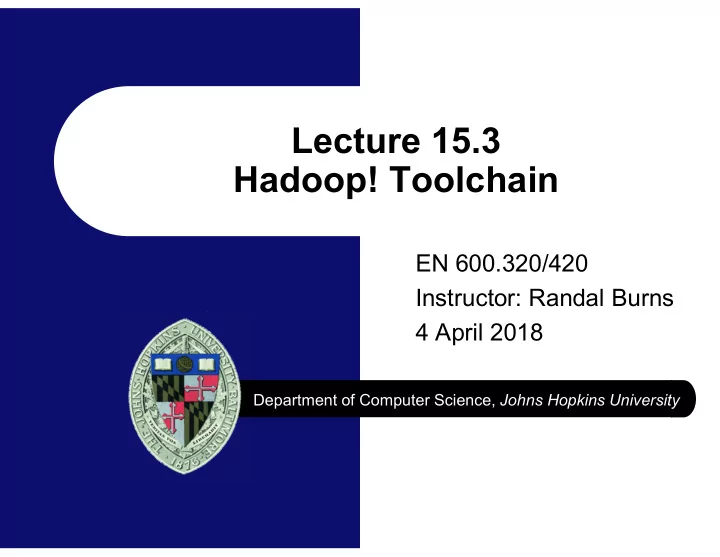

Lecture 15.3 Hadoop! Toolchain EN 600.320/420 Instructor: Randal Burns 4 April 2018 Department of Computer Science, Johns Hopkins University
The Hadoop Tool Chain The command line tool chain – Build files into directory – Construct java archive (jar) – Point Hadoop! at the jar Many prefer to use Eclipse instead Lecture 15: Map/Reduce Part 2
Hadoop! Configurations Hadoop! is a heterogeneous, distributed system – Many components: namenode, hdfs, reporting – Parallelization (mappers, reducers, shuffle, loading) – Typically involves managing a cluster But can run in several simpler ways – Pseudo-distributed (full runtime on one machine) – Fully distributed (on a cluster) Running on pre-configured clusters – Specify size and types of nodes – Launch a compiled JAVA jar file or streaming scripts – AWS, Azure, Joyent, IBM, RackSpace – Metaservices: Cloudera Lecture 15: Map/Reduce Part 2
Hadoop! Streaming Given arbitrary string processing functions to the Hadoop! Environment – A map script and a reduce script Almost equivalent to: – cat inputdir/* | mapper.py | sort | reducer.py Lecture 15: Map/Reduce Part 2
Streaming and Sorting Streaming mode in Hadoop! Gives a different sorting guarantee – Recall: cat inputdir/* | mapper.py | sort | reducer.py Why? Same or different semantics? Any performance implications? Lecture 15: Map/Reduce Part 2
Streaming and Sorting Streaming mode in Hadoop! Gives a different sorting guarantee – Recall: cat inputdir/* | mapper.py | sort | reducer.py Why? – There is no schema – So, it sorts the whole output of mapper.py as a key – This is more restrictive than the default sort – And, thus, less efficient Lecture 15: Map/Reduce Part 2
Map/Reduce Recast (8 y.o. #s) Scanning engine – Use massive parallelism to look at large data sets Performance on 100 TB data sets – 1 node @ 50 MB/s (STR of disk) = 23 days – 1000 nodes = 33 minutes Batch Processing – Not real-time/user facing Large production environments – Not useful on small scales – Too much overhead on small jobs Lecture 15: Map/Reduce Part 2
Recommend
More recommend